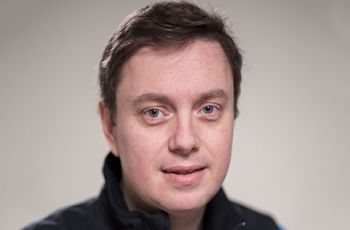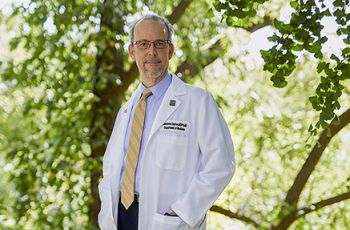
For years Kevin Pelphrey, PhD, has wanted to explore the effectiveness of using a drug to prime the brain for evidence-based intervention. Now, with the help of a grant from the Simons Foundation, Pelphrey, the Carbonell Family Professor in Autism and Neurodevelopmental Disorders and director of George Washington University’s Autism and Neurodevelopmental Disorders Institute, has the opportunity to test the effects of a neuropeptide on children with autism.
The grant will fund a double-blind treatment study giving patients either oxytocin or a placebo, followed by pivotal-response training, an evidence-based behavioral intervention. The brain activity of each child will be recorded via functional magnetic resonance imaging before the study begins to determine if the use of oxytocin helps improve the impact of behavioral therapy.
“It’s a different way of developing treatments for autism, because it’s combining drugs and behavior, where usually those are done separately,” said Pelphrey, who will conduct the study alongside Pamela Ventola, PhD, assistant professor at the Yale Child Study Center.
About 60 children, ranging in ages from 4 to 8, will participate in the study and 16-weeks of pivotal response training. Pelphrey and Ventola will not know which child received oxytocin and which received the placebo.
“Our prediction is that for kids who have certain low-levels of social brain activity, and activity in certain reward circuits related to social motivation, when they are given oxytocin they’ll benefit more from the behavioral therapy,” Pelphrey said. Currently, behavioral interventions are effective for about half of children, but Pelphrey said if a drug can make those interventions work for another 30 or 40 percent of patients, “then we would be able to up our impact on autism and be able to help a lot more people.”
The behavioral intervention was developed at the University of California, Santa Barbara, and focuses on social communication and social cognition. The therapy is designed to go after the core symptoms of autism, said Pelphrey, which include lack of eye contact, difficulty understanding the importance of social interaction or not finding it enjoyable, and problems taking turns in conversations.
It’s an unusual approach to a drug trial, he explains, because often the context in which the drug is given does not carry much weight. However, in this study that context — the behavioral therapy — is key.
“It’s the kind of study I’ve always wanted to do,” Pelphrey said. “The Simons Foundation is a great organization that’s funding things that aren’t easy to get funded, that are … cutting-edge. We were really excited that they were willing to have us do this.”


